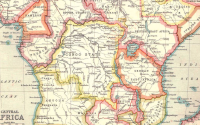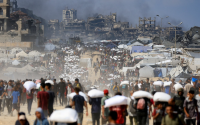LeaderWednesday April 17, 2002Jenin camp looks like the scene of a crime. Its concrete rubble and tortured metal evokes another horror half a world away in New York, smaller in scale but every bit as repellent in its particulars, no less distressing, and every bit as man-made. Jenin smells like a crime. The stench of decaying flesh, of dead bodies left to rot or buried unabsolved under collapsed buildings greets those aid workers and reporters who manage to gain access. What cruel deficit of pity denies those who died the benefit of departing grace? Jenin feels like a crime. No sentient person can sift this evidence of broken lives and homes; witness the dry-eyed children, their minds shocked and twisted beyond words; look upon the detritus of a frugal, refugee existence - tin plates in a kitchen sink, cheap bathroom tiles, abandoned sleeping mats - turned into ownerless rubbish by bullets, bulldozers and rockets; and not demand an urgent reckoning. Jenin already has that aura of infamy that attaches to a crime of especial notoriety. The story of Jenin, as yet still half-told, is set to live on in memory and myth, as nightmare and as heroic apocalypse, gaining a separate existence and significance in the history of the Palestinian struggle. As the leading peace campaigner, Uri Avnery, points out, Jenin, like the Jews' Massada, could be the stuff of legend upon which dreams are built, informing, defining (and perhaps warping) the consciousness of the emerging Palestinian nation state. Such myth-making and nation-building hardly formed a part of Ariel Sharon's plan when he sent his soldiers into Jenin. But nor is it entirely proper to portray the camp battles, in which still unknown numbers of people were killed or wounded, as victories for either side, moral or otherwise. Both are losers; and if the leaders of the "international community" had been more resolute Mr Sharon would have been no more able to mount his West Bank invasion than Hamas would have been allowed to pursue its suicidal attacks. Yet while Mr Sharon's talent for wanton destruction has once again proved deeply counter-productive, is he also guilty, as the Palestinians claim, of a heinous and exceptional crime? In short, what really happened inside Jenin? The world needs to know. To that end, Jenin must be treated like a crime scene, investigated without delay, before the evidence disappears or is destroyed. The UN human rights commission has ordered an inquiry led by Mary Robinson. Israel and the Palestinians should cooperate fully - and even if they cannot agree a general ceasefire, in Jenin at least the truce must hold. The EU's aid commissioner says Israel breached the 1949 Geneva convention by blocking the delivery of humanitarian assistance in Jenin. Israel must ensure that all restrictions on aid agency and media access are lifted forthwith. These and other aspects of its behaviour in Jenin in respect of civilian rights, treatment of prisoners and the disposal of bodies must also be investigated - as should Israeli claims that Palestinian gunmen used civilians as human shields. The world needs to know what really happened in Jenin if only to be better equipped to stop it happening again. Both Israelis and Palestinians need to know, because more disinformation, more denial and lies, and yet more tragic myth-making only feed the hatred and deepen the divide. Most of all perhaps, the children of Jenin need to know. The future of this land, if it still has one, lies with them. To deny them the truth would be yet another crime. Guardian Unlimited © Guardian Newspapers Limited 2002
Canlı Yayın
Kâinatın tüm seslerine, renklerine, titreşimlerine Açık Radyo...
Ekolojiden siyasete, edebiyattan müziğe Apaçık Radyo'da haftanın öne çıkan gündemleri mail kutunuzda!
İletişim
Açık Medya Yayıncılık A.Ş.
Koltukçular Çıkmazı No 7 İç Kapı No 2
Tophane, Beyoğlu, İstanbul, TR-34425
Telefon: +90 212 343 4040
Faks: +90 212 232 3219
E-posta: [email protected]






